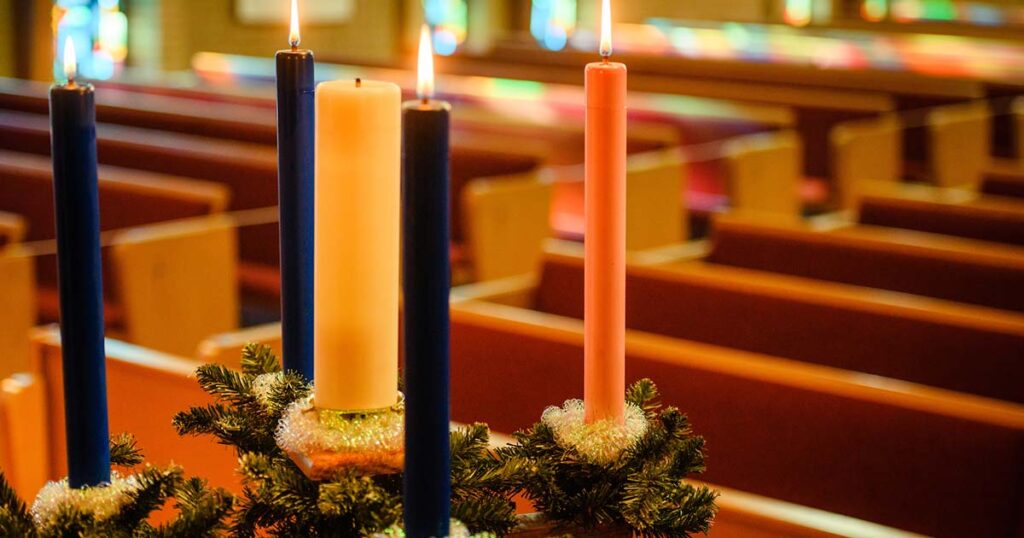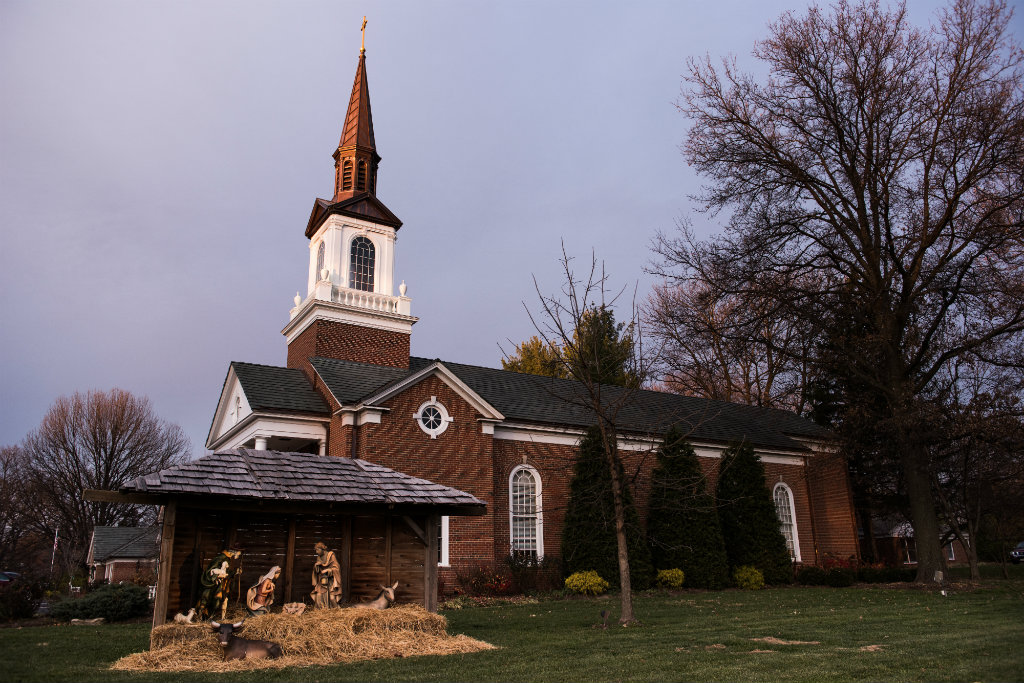Ah, Christmas: that wonderful time of year when the church music and readings are all comfortably familiar — and the strange people sitting in your favorite pew are not.
The phenomenon of church visitors at Christmas is a time-honored part of holiday tradition — C&E-ers; we call them “Christmas and Easter people.” Yet the reality is more complex. Some are, indeed, nominal Christians and noncommittal church members who only attend worship services on major holidays. Others are family members and friends visiting from out of town, or local loved ones purposely invited for the occasion. (Who can refuse a church invitation from Grandma at Christmas?) Still others, however, are genuine “church shoppers,” actively on the hunt for a new church home.
I should know. I’m one of them.
As a Navy chaplain’s wife, I am called to support my husband in his vocation wherever it leads. Last year, that meant keeping the home fires burning while he was deployed. This year, it means attending and volunteering at the base chapel where he preaches regularly.
Yet I am also called to raise up our children in the Lutheran faith we share — and whenever we move, as we did once again this summer — that means church shopping.
Church shoppers often get a bad rap, and sometimes it’s justified. We can all probably think of a disgruntled person or two who stomped away in a huff from one church in order to hunt for a more perfect congregation elsewhere. We can also probably call to mind picky people whose American consumerist tendencies keep them long on the fringes as they search out a congregation with just the right set of amenities.
Yet church shopping (or “visiting with an eye to joining,” as it might be more accurately and less crassly termed) is nonetheless a fixed part of the American religious experience. We are a mobile people, and that means that a sizable portion of us — including me — will be regularly uprooted and in need of a new church home.
Uncomfortable, but good
It can be uncomfortable for established members to share their worship services with these clumsy newcomers — but take it from me: It can be even more uncomfortable for the visitors. Chances are, we won’t know all or even any of the songs. (In my experience, this is equally true whether a church uses hymns or praise music.) We won’t be familiar with all the nuances of the liturgy. (And don’t be deceived: even churches that follow the hymnal rubrics carefully introduce idiomatic nuances.) We won’t know how the offering is passed and whether we’re expected to contribute, or how to share the peace and the friendship register. We’ll feel awkward leaving before coffee hour, and even more awkward staying. And don’t get me started on Holy Communion …
This is all true even if everything goes smoothly. It doesn’t always. We’ve been at churches where we showed up at the wrong time because the website was out of date. We’ve watched our introverted kids shrink down in the pews when the pastor asked first-time visitors to “stand up and wave!” We’ve had church greeters mournfully bemoan the lack of young families at the congregation while handing us our bulletins. We’ve gotten stuck in emergency voters’ meetings sandwiched in between the benediction and the postlude.
Yes, it’s uncomfortable to be a church shopper, but it’s also very good. When I visit any of the sister congregations of The Lutheran Church—Missouri Synod, I receive God’s Word and Sacraments — free of charge, full of grace, no strings attached — and I am blessed. What’s more, the loving hospitality of the people of God regularly blows me away.
It’s a very good thing for churches, too, when visitors stop in. God wants His church to be full of people — new believers and old, those who are both sinners and saints. His angels rejoice whenever anyone walks through the doors of a church building and hears the Good News about Jesus. And when visitors arrive, they give Christians a blessed opportunity to show godly hospitality — and maybe even “entertain angels unaware.”
Making a list and checking it twice
Awkwardness aside, it is a very good thing for all involved when church shoppers show up on a Sunday — such a good thing that outreach-minded Christians can be tempted to bend over backwards to anticipate and meet the expectations of their guests. Isn’t that what good customer service is all about? Making sure that shoppers find and check off every item on their shopping lists? And isn’t the customer always right?
I’ve been guilty of falling prey to this mindset, both as a church member and as a church shopper. I’ve certainly approached the church shopping task with a House Hunters-worthy list of “must-haves” in the back of my mind. Haven’t you? What’s on your list? Good music? A virtuoso organist, rocking praise band or concert choir? A specific approach to the liturgy? Weekly communion? Special activities and programs for young families? … young adults? … youth? … seniors? Are you looking for a church that offers abundant opportunities for social fellowship? … Bible study? … community service? … missionary outreach? … really good coffee?
For my part, I can recall in the past having intentionally sought out churches that were “traditional, but not stuffy”; churches filled with a broad range of ages — babies to grandmas, and everything in between; and churches where folks appreciated a good potluck supper as much as I do. Sometimes, I’ve found those churches. Sometimes, though — usually, in fact — it didn’t matter.
The greatest [church shopping wish list]
In the end, turning church shoppers like me into satisfied customers — or better yet, into active members of the Body of Christ — isn’t about anticipating what we want and fulfilling our every desire, expressed or otherwise. Rather, it’s about looking beneath the surface, recognizing what we truly need and supplying it. I’ve been to churches that checked off every item on my wish list but ultimately failed to satisfy. I’ve been to other churches that, on the surface, offered nothing all that special but sent me out with my heart singing and my cup overflowing. What made the difference? I can think of two things, and both of them are love, as embodied by the words of Christ in Matthew 22:34–39:
But when the Pharisees heard that he had silenced the Sadducees, they gathered together. And one of them, a lawyer, asked him a question to test him. “Teacher, which is the great commandment in the Law?” And he said to him, “You shall love the Lord your God with all your heart and with all your soul and with all your mind. This is the great and first commandment. And a second is like it: You shall love your neighbor as yourself. On these two commandments depend all the Law and the Prophets.”
- A church that truly satisfies is one in which its members love and honor the Lord with all that is within them. In this church, the pastor preaches biblically sound, Christ-centered, Law and Gospel sermons and feeds the people “Christ crucified” at every opportunity — from the pulpit, at the altar, around the Bible study table and anywhere else he may be. The people in turn come gladly, listen hungrily, give freely, pray earnestly and worship joyfully. They take their faith seriously, and it goes more than skin deep, permeating every part of their lives. They are delighted to gather in the presence of Christ each week for the Divine Service, and they receive His good gifts with hopeful, happy hearts.
- A church that truly satisfies is one in which its members love their neighbors as themselves. This love isn’t superficial — something pasted on to look good when visitors show up; it penetrates to the core. It’s a love that wells up naturally because “Christ first loved us.” There’s affection involved — they can joke and chitchat with each other around the dessert buffet in the fellowship hall, to be sure. But there’s a more profound compassion hiding beneath the friendly banter. When someone is hospitalized, or loses a loved one, or suffers any of life’s myriad tragedies, the church is there — in person if they can be, in prayer if they can’t. “By this all people will know that you are my disciples, if you have love for one another” (John 13:35). This love — this faithful, self-sacrificial love shared among brothers and sisters in Christ — draws lonely souls in. It makes church shoppers like me want what they have, and lets us dare to hope that we, too, can be folded up in its embrace.
Who is my neighbor?
But should such precious love — for God, for neighbor — really be lavished on fly-by-night visitors? Should church members really be so spendthrift with the grace of God as to waste it on people they may never see again?
Yes.
The answer seems simple, but the question is a serious one, and for good reason. Whenever a church fits the description I outlined above — when its people truly love to be together in the house of the Lord — cliquishness comes easily. They’ve got a good thing going. Why risk it by welcoming in a stranger who might accidentally upset the apple cart?
Yet this is exactly what God calls them — and all of us — to do.
“Who is my neighbor?” the lawyer asks Jesus in Luke 10. Jesus responds with the Parable of the Good Samaritan, in which a traveling Samaritan shows mercy to a man who has been beaten and left for dead. There are several layers to this parable, but one that I see lying right on the surface is this: The neighbor you are to love is the person God has put in front of you — even if they’re different, and especially if they need your help.
Thus, when the Holy Spirit brings visitors and “church shoppers” to our congregations this holiday season, let’s welcome them as the precious gift that they are, entrusted to us by God. Let’s recognize that Christ, our Good Samaritan, carries each wounded and half dead soul to the inn of the church, attends to them there, and tells His people, “Take care of him, and whatever more you spend, I will repay you when I come back” (Luke 10:35).
This almost goes without saying, but let’s not give them the stink eye if they sit in our pew. Let’s say hello to them, introduce ourselves, explain a little about how the liturgy (and especially Holy Communion) works and invite them to stick around for fellowship or Bible study afterward.
At Christmas time and always, let’s remember that God’s gracious will for every visitor, church shopper, and sojourner who steps into our churches is this: That they will find love — Christ’s love, our love — waiting for them there.
Photo: LCMS Communications/Erik M. Lunsford






What a wonderful read. Thank you so very much